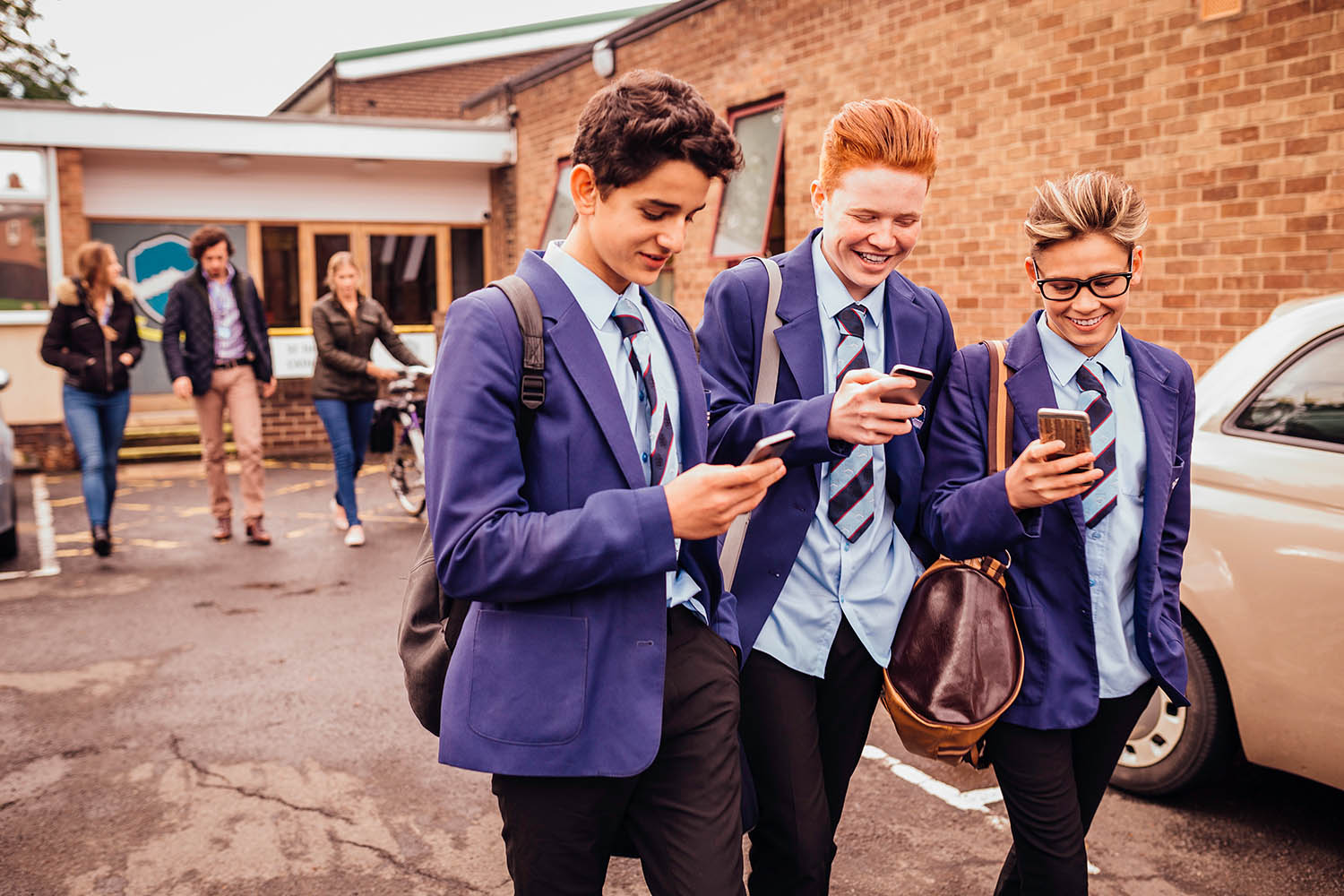Damian McBeath
I’m sure we agree that schools exist to help children flourish – but where do smartphones fit into all of this? Is there any evidence that bringing a smartphone into school improves a child’s focus, confidence, safety, sense of identity? The answer is a firm no. More than 90% of schools in England have implemented bans – including more than 99% of primary schools. The Department for Education (DfE) and Ofsted back a ban and 70% of parents in the UK agree. Many districts in the US are choosing to become phone-free, Ireland is banning phones from schools, Australia already has. My school banned them more than a year ago and the impact has been transformational. Last weekend 59% of teachers at the NASUWT conference stated that behaviour had deteriorated because of social media. The London School of Economics found that banning smartphones improves test scores. Robert, I am intrigued to hear why you think a ban is not an appropriate response…
Dr Robert Harrison
I suspect we agree on the potential danger of mobile technologies and social media for young people, and that all schools should be positive learning environments, free from distraction and focused on the academic and personal development of young people. Our schools absolutely limit students’ use of mobile phones during the school day, collaborating with parents and students to ensure a positive learning environment. But I think this debate has taken on some of the characteristics of a moral panic. People like Jonathan Haidt [the American social psychologist and author of The Anxious Generation] have helped to create a bugbear of smartphones and social media, and there’s no good evidence that there’s any cause-and-effect relationship between smartphone ownership, social media usage and adolescent mental health.
I just don’t see how a ban is going to push back the tide. I think we’d be better off putting our energy into helping young people learn to manage technology responsibly. The problems are real, but a ban won’t make them magically go away.
We have a moral obligation to embrace the new world we're sending children into
We have a moral obligation to embrace the new world we're sending children into
Robert Harrison
DMcB: I’m not sure I would agree that the devastating impact of smartphones on children is “moral panic”. In my school, we had seen the terrible safeguarding impact. We watched pupils speak to each other online in ways they wouldn’t in person. We don’t need a causal link to see the impact – we can just ask the children. Which is what Rachel de Souza, the children’s commissioner for England, did: and they said they wished they had got their phones later. Children from my school said the same – 12 months after banning phones, only 11% said they’d have them back if they could.
RH: But I wonder how effective a ban during the school day is. Some studies suggest that school day bans only intensify what happens at home. I agree that digital technologies can supercharge and intensify adolescent concerns, but I’m quite sure the social-emotional development of teenagers hasn’t fundamentally changed. Today’s young people don’t distinguish between their digital and “real world” lives – they only have one existence. Headteachers have plenty of ways to engage with their communities, and work with their pupils, to sort out what works in school, without a government ban. In fact, the government’s current non-statutory guidance does just that. I’m not sure what more an outright ban would accomplish rather than encourage greater fearmongering or guilt tripping.
DMcB: In our school, pupils put [phones] in lockable pouches. When children are connecting more in the real world they are politer, nicer. Regarding their digital world development – it is not one of connection, it is one of being judged by others. More than 90% of schools have a school “ban”, [though] the majority say “switch off and leave in your bags while in school”, but these bans are not effective; 60% of teachers in schools with bans report seeing phones out. How can we ask a child to resist the pull of a multibillion-pound industry whose very aim is to keep them online? Even if their parents have put restrictions on their phone, their friend could just show them [inappropriate] content.
RH: I’d argue that the best possible safeguarding response is helping students learn how to become responsible digital citizens, and using their mobile phones to practise digital literacies and civil engagement while at school! We have to find ways to help children to have healthy, intentional, relationships with technology that enhances their lives. That is the main idea of contextual safeguarding – helping children and their parents understand and manage risk at school and in the wider community.
I think we should be engaging critically with people like Jordan Shapiro, who makes a strong case in The New Childhood, for example, that we have a moral obligation and educational duty to embrace the brave new world into which we’re sending young people. In fact, they are already living there.
Newsletters
Choose the newsletters you want to receive
View more
For information about how The Observer protects your data, read our Privacy Policy
We can’t keep children in a technology-free bubble. While smartphones offer some unique challenges, most of the concerns you’ve shared about them are largely the same for tablets and laptops. It’s not responsible to ban it all.
DMcB: This isn’t about banning technology; it’s about removing distraction, addiction and harm from learning environments. We agree that young people need to become responsible digital citizens, but that doesn’t require daily access to smartphones during school hours. In fact, unstructured exposure can reinforce poor habits rather than teach discernment. Smartphones have been shown to reduce attention, increase anxiety and contribute to bullying and body image issues – particularly for girls. In contrast, structured curricula, supervised digital experiences using school-managed devices, and clear boundaries are far more effective in building digital literacy and resilience. A smartphone-free school is not a tech-free bubble, but a sanctuary.
You don’t teach a child to cross the road by putting them on the A40 and wishing them the best
You don’t teach a child to cross the road by putting them on the A40 and wishing them the best
Damian McBeath
RH: I’m all for students learning how to be fully human, and to build personal relationships beyond cyberspace. But we have an obligation to support them as they discover who they are and how they will work in a technology-enabled world in which digital tools – and the potential for personal and social harm – is only going to grow. To keep mobile devices out of this mix seems a bit like banning kids from studying government because they can’t vote. That analogy is more on target than equating mobile phones with alcohol, drugs and firearms.
We also did not mention the practical problems with all-out bans. The US state of Florida issued an all-out ban and it’s been a nightmare to enforce. Bans can tend to reinforce social inequity – NYC schools ended their ban when it became clear that it was effectively only being implemented in less economically advantaged communities.
DMcB: I completely disagree with your comparisons. Smartphones are known to cause harm. You don’t teach a child to cross the road by putting them in the middle of the A40 and wishing them all the best. When teaching children new skills such as digital literacy or crossing the road, you do so while holding their hand – guiding them, showing them the dangers in a safe space. Schools can do this without the use of a smartphone, the very thing that causes the harm. You can do so with a laptop. You make comments about smartphones’ incredible potential – yet the research showing the impact of this is very light, such as the LSE study (2016) that found the opposite. It is my view that children shouldn’t have a smartphone until 14 and social media should be restricted to 16 or over.
RH: I think the research on smartphones you cite is not universal, is contestable and is overly negative. Schools should be free to choose.
I’m sure aspects of school are better managed without mobile phones, even though I think an outright ban is overreaching and unnecessary. The social consensus on what age kids get phones is settling in at around 12 – what we see in our schools. But tablets are part of our IT strategy and educational philosophy from preschool onwards.
We’d rather see what students are doing and talk with them about it, than wrap the issue in a box and hope it goes away. And we didn’t even talk about the importance of adults modelling good practice, which is too bad!
I appreciate your passion and perspective, Damian. On the misuse of mobile devices, and its many impacts, we are in full agreement.


